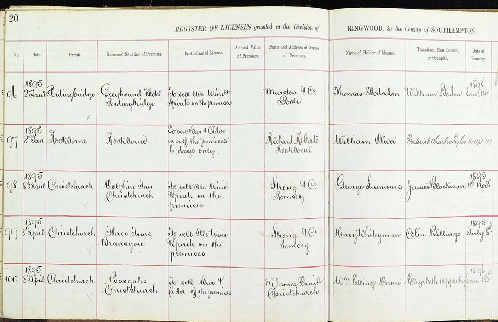The public house has been an important social institution since the Romans in this country. No doubt, many of us like to enjoy a glass or two in a local pub! But have you ever thought about the history of the establishment that you may be visiting? We know that the comment made frequently is “there is nothing quite like the English Pub!” So if you are interested in delving into the history of a pub then sources here at Hampshire Record Office may help you investigate further.
The origins of “pubs” can be traced back to Roman taverns, through the Anglo-Saxon alehouse to the development of the tied house, sadly though records at Hampshire Record Office will not be able to prove that! Historically, alehouses, inns and taverns, which collectively became known as public houses and then simply as pubs, came into being around the reign of King Henry VII. A little later, in 1552, an Act was passed that required innkeepers to have a licence in order to run a pub.

List of victuallers’ licences issued at the Michaelmas Sessions in 1745, giving the names of the victuallers and their inns (Q9/2/8)
Moving into the 16th century, local Justices of the Peace had responsibility for granting licences to individuals who wished to sell intoxicating liquor. These types of records can be found in the county or borough Quarter Sessions collections at Hampshire Record Office. Gradually, what became known as Petty Sessions developed during the 17th and 18th centuries, taking over some of the responsibilities of the Quarter Sessions, often including licensing of public houses. Although individuals could be convicted, as documents held here reveal, such as John Smith for selling ‘ale and beer’ without a licence, Corporation of Basingstoke, dated 1743 (reference 148M71/5/6/5/41).
Moving on into the 19th century the 1872 Intoxicating Liquor Act obliged the clerks of licensing divisions to keep registers of all licences granted. These separate registers can be found in the Petty Sessions during the 19th century. Use our on-line catalogue to see if we hold any relevant Petty Sessions records or Quarter Sessions records: http://calm.hants.gov.uk/

Register of licenses Ringwood, 1896 (1M72/39)
Many areas in Hampshire will, of course, have fine examples of historic pubs. For example, one of the oldest pubs in Winchester, The Eclipse Inn, dates back to 1580 and is still open today. Originally thought to be the rectory of St Lawrence church, it became an ale-house in the late 18th century and then what we would recognise today as a pub, in the 1800s. Its claim to fame is that the ghost of Lady Alicia Lisle, who was beheaded in Winchester, spent her last days in a small room at the inn in 1685. Rumour has it that she haunts the building on the top floor! Having personally visited this establishment, I have not met her!
 The Eclipse Inn,1972. Credited C P Saunders of Southampton (9A08/36/3)
The Eclipse Inn,1972. Credited C P Saunders of Southampton (9A08/36/3)
Along with licensing records, there are other types of documents that can be used for tracing the history of pubs, such as building control plans, trade directories, photographs, brewery records, census returns, newspapers, land records, rate books. In fact, there is a wealth of different sources to try! So if you are just interested in the history of your local pub, or have just become a landlord, and want to know more about it, then the history could start here…!
Gina Hynard (Search Room Team)


My ancestor, John Rouse (and his wife Sally, nee Rogers) was the innkeeper at The George Inn, Fordingbridge, until his death on 2nd March 1851, from influenza and typhus fever.
The cellers of the Inn used to frequently flood, but in January 1852, the Inn caught fire after it had started in the shoe shop next door and the Inn burnt down.
LikeLiked by 1 person
Thank you for sharing and it’s wonderful to see the research that you have done and what you have been able to find out.
LikeLike
I am sure I heard the ghost of Lady Alice when I visited The Eclipse! I went upstairs to use the little girls’ room, and heard footsteps coming along the hall, stopping just outside the loo… I fully expected to see someone waiting when I opened the door, but there was no one there! I was so perplexed, and when I rejoined my family downstairs (we were sitting right next to the stairs) I asked if someone had come up after me (or down just before me) they assured me no one had. It really left me with a weird feeling, and it wasn’t until some time later that I read about Lady Alice and her stepping out of an upstairs window onto the gallows, and that she allegedly haunts the Eclipse.
LikeLiked by 1 person